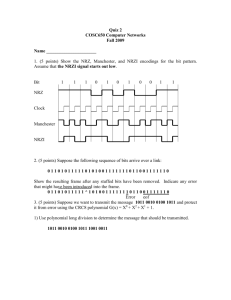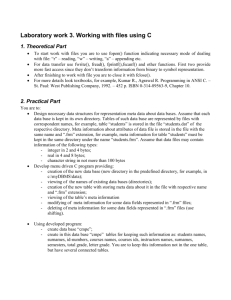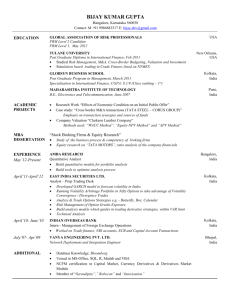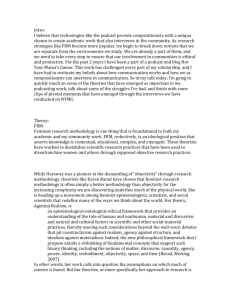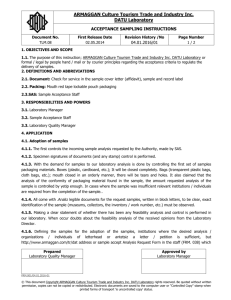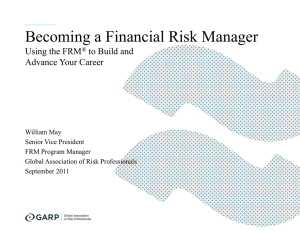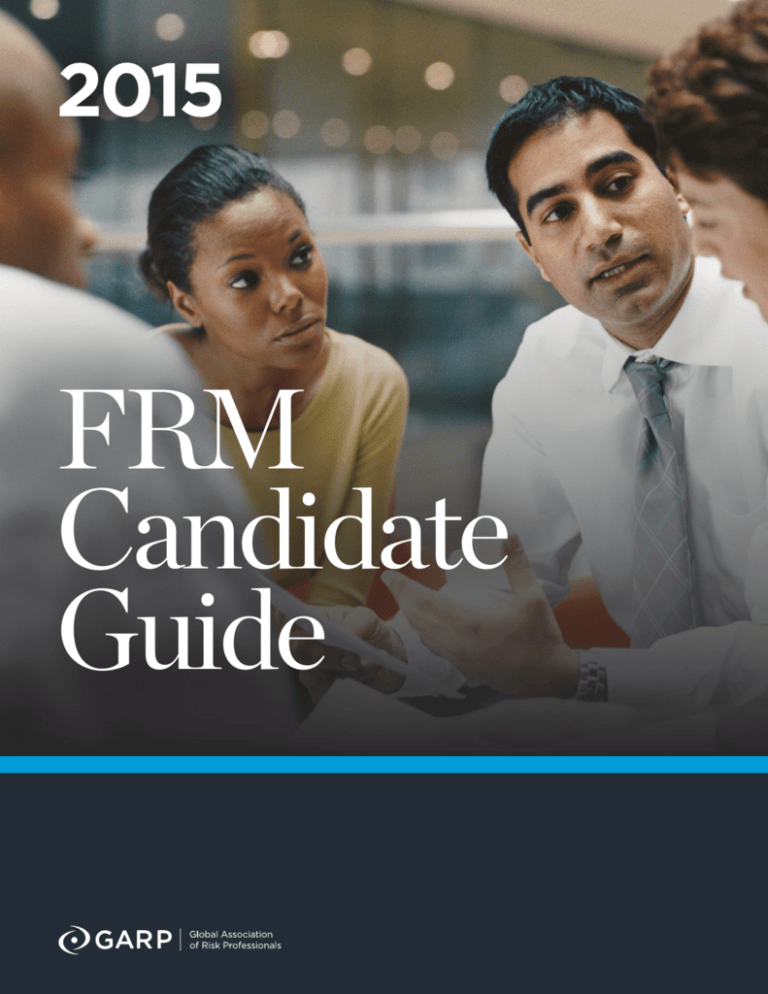
2015
FRM
Candidate
Guide
FRM® Candidate Guide | OveRview
The Financial Risk Manager (FRM®) designation is
the most globally respected and widely recognized
certification for financial risk management.
The FRM Program ensures that FRMs have mastered the
the FRM exam Part ii focuses on the application of the
necessary skills and knowledge to succeed in today’s
tools acquired in the FRM exam Part i through a deeper
rapidly changing financial industry. To achieve the status
exploration of:
of Certified FRM, candidates must pass a rigorous two-part
•
Market risk management
examination and also have completed two years of qualified
•
Credit risk management
work experience.
•
Operational and integrated risk management
•
Investment risk management
•
Current market issues
The FRM Exam, offered by GARP (the Global Association
of Risk Professionals), is a practice-oriented exam designed
to assess a candidate’s knowledge and understanding of
After passing the FRM Exam Part II, candidates must
the skills necessary to function effectively as a financial risk
demonstrate a minimum of two years of risk related
manager. The FRM Exam is updated annually to be reflec-
full-time professional experience to become certified. No
tive of the latest trends in the global financial markets and is
other financial risk designation requires its candidates to
designed by a group of distinguished risk professionals and
demonstrate related professional experience, so becoming
academics with diverse backgrounds. In preparing for the
an FRM means considerably more than passing a test.
FRM Exam, you will gain the practical knowledge necessary
Achieving FRM certification provides you with a career-long
to succeed as a financial risk manager.
way to expand your professional opportunities. You will
become part of a network of FRMs in over 100 countries.
the FRM exam Part i covers the tools used to assess
Moreover, employers know that FRMs have the relevant
financial risk:
knowledge with which to anticipate, respond and adapt to
•
Quantitative analysis
critical issues, providing them with an edge in their career
•
Fundamental risk management concepts
and professional development.
•
Financial markets and products
•
Valuation and risk models
1
The FRM Program is a career-long
professional resource that positions
FRMs as the standard-bearers of the
risk profession.
Enrolling in the FRM Program is straightforward as you
may register for the FRM Exam online on our website
(www.garp.org). There are no educational or professional
prerequisites to register for the FRM Exam. The two-part
FRM Exam tests progressive, cumulative knowledge, and
the concepts tested on the FRM Exam Part I are needed
for Part II. Once you have passed the FRM Exam Part I,
you have four years to pass Part II. After passing both
parts of the FRM Exam, you have five years to satisfy a
work experience requirement to become certified. Only
then can you officially use the FRM designation. FRM
candidates must demonstrate a minimum of two years of
professional full-time work experience in the area of financial
risk management or another related field including, but not
limited to: trading, portfolio management, faculty academic,
industry research, economics, auditing, risk consulting,
and/or risk technology.
GARP’s Continuing Professional Development (CPD)
program provides FRMs with a formal means to meet the
growing demands and knowledge requirements of their
profession while ensuring the ongoing integrity of their
certification. The CPD Program requires 40 credit hours
to be earned every two years. Although participation in
the CPD Program is voluntary, FRMs are encouraged to
participate in the program throughout their career.
PaRt i
eXaM
4 hours/
100
questions
2
PaRt ii
eXaM
4 hours/
80
questions
demonstrate
2 Years
Related
work
experience
voluntary
Continuing
education
40 hours/
2 years
2014: A record 40,308 registrations
for the FRM Exam
Top 10 countries/regions with
the most FRM candidates:
China, India, U.S., South Korea,
Hong Kong, Canada, United
Kingdom, Singapore, Taiwan,
and Germany
6,000+
organizations
had candidates
register for
the 2014
FRM Exam
{
in 2014
FRM candidates
came from
143 different
countries and
territories
25
of the top 25 global
banks are represented
by Certified FRMs
The FRM Exam: Structure and Content
GARP’s FRM Committee, comprised of prominent global
•
Foundations of Risk Management (20%)
risk management professionals and academics, establishes
This area focuses on a candidate’s knowledge of founda-
the topic areas to be tested in the FRM Exam on an annual
tional concepts of risk management and how it can add
basis. To calibrate and benchmark our understanding of the
value to an organization, including:
demands of the global risk management community, GARP
•
An understanding of corporate risk governance and
the trade-off between risk and return
conducts formal job task analysis surveys to determine
the knowledge, skills and abilities required to function
•
The construction of efficient portfolios
effectively as a financial risk manager around the world.
•
Fundamental asset pricing models
Once topic areas are determined, they are published in
•
Enterprise risk management frameworks
the FRM Study Guide. More detailed knowledge points
•
Data quality management
associated with these topic areas are contained in the FRM
•
A review of major financial disasters
Program Manual, which is made available to registered
•
To emphasize the importance of ethics as a fundamental requirement for sound risk management,
FRM candidates.
applications of the GARP Code of Conduct to profesFRM Exam Structure
sional situations are covered in this section as well
The FRM Exam consists of two parts—Part I and Part II—
that are both offered twice a year on the third Saturday
•
Quantitative analysis (20%)
of May and November. The FRM Exam Part I is an equally-
This area tests a candidate’s knowledge of basic proba-
weighted 100 question multiple-choice exam offered in
bility and statistics, regression and time series analysis,
the morning and Part II is an equally-weighted 80 question
and various quantitative techniques useful in risk
multiple-choice exam offered in the afternoon. The FRM
management such as:
Exam Part I and Part II each have a maximum allowable
•
Monte Carlo methods
time of four hours for completion. It is important to note
•
Volatility forecasting models
that the FRM Exam Part I and Part II must be passed
•
Value-at-Risk estimation
sequentially; therefore, while it is possible to sit for both
parts of the exam on the same day, a candidate must
•
Financial Markets and Products (30%)
receive a passing score on the FRM Exam Part I before
This area tests the candidate’s knowledge of financial
GARP will mark his or her Part II examination. Most candi-
products and the markets in which they trade, including:
dates elect to take the FRM Exam Part I and Part II on
•
Futures and forwards
separate exam administration days.
•
Equity options, swaps, and other derivatives
•
Commodities
FRM Exam Part I Content
•
Currencies
The FRM Exam Part I covers the fundamental tools and
•
Corporate bonds and interest rates
techniques used in risk management and the theories that
•
A basic understanding of arbitrage arguments and
underlie their use. Specific areas of coverage are:
4
hedging related to these financial products
•
valuation and Risk Models (30%)
•
Operational and integrated Risk Management (25%)
This area will test a candidate’s knowledge of valuation
This section addresses a candidate’s knowledge of
techniques and risk models. This includes:
two areas of increasing importance for many firms—
•
Basic bond valuation and bond hedging
operational risk management and integrated risk
•
Valuation using binomial trees
management. This includes:
•
An understanding of the Black-Scholes-Merton model
•
Coverage of the tools and techniques necessary to
•
Value-at-Risk (VaR)
•
Expected and unexpected loss estimation
•
Economic capital allocation
•
Stress testing
•
Enterprise risk management (ERM)
•
Knowledge of critical issues related to liquidity risk
measure, manage, and mitigate operational risk
FRM Exam Part II Content
management, model risk, loss data modeling and IT
The FRM Exam Part II further applies the techniques and
infrastructure, stress testing, and risk appetite
•
tools covered in Part I, and delves more deeply into major
Importantly, this section also tests a candidate’s
sub-areas of risk management. Specific areas of coverage
knowledge of key regulations and the major inter-
include:
national regulatory frameworks relevant to risk
managers today, such as Basel
•
Market Risk Management (25%)
This section tests a candidate’s knowledge of
•
Risk Management and investment Risk
market risk measurement and management techniques.
Management (15%)
These include:
This area focuses on a candidate’s knowledge of risk
•
Fixed-income interest rate sensitivities
management techniques applied to the investment
•
Volatility exposures
management process. Topics such as portfolio construc-
•
Value-at-Risk (VaR) and backtesting VaR
tion and performance analysis are covered, as well as
•
Expected shortfall (ES)
risk budgeting and portfolio and component VaR. Issues
•
Correlations and copulas
related to hedge funds and private equity investments
•
Parametric and non-parametric estimation methods
are also covered.
•
Extreme value theory (EVT)
•
Exotic options and mortgage-backed securities
•
Current issues in Financial Markets (10%)
The candidate is expected to familiarize him/herself with
•
Credit Risk Management (25%)
the readings from this section, approaching each paper
This area focuses on a candidate’s understanding
critically as a risk manager equipped with the knowledge
of credit risk management with some focus given
from the other sections. This area of the exam will test a
to structured finance and credit products such as
candidate’s knowledge of the material covered by each
collateralized debt obligations and credit derivatives.
paper. Recent topics have included:
Knowledge of counterparty risk is also tested, as well
•
Sovereign Risk and Financial Crisis
as default risk and methodologies used to measure it,
•
Flash Crash
such as Credit VaR.
•
Financial Innovation and its Issues
5
Registering for the FRM
Exam Dates
Fees can be paid via secure online payment, by check
In 2015, the FRM Exam will be offered on May 16, 2015 and
(if drawn on a U.S. bank and payable in U.S. dollars), or by
November 21, 2015.
wire transfer. More information about fees can be found
on our website.
Registration Periods
Candidates can register online for the FRM in one of three
Deferrals
registration periods: Early, Standard, and Late. There is a
An FRM candidate may only defer exam registration once
difference in price between the three periods.
to the next test date. Please note:
•
Registering for the FRM Exam Part II
A deferral to the next examination date must be
submitted by the last day of registration. For example,
Candidates can only register for the FRM Exam Part II after
the last day of registration for the May Exam is April 15;
they have successfully passed Part I, unless they register to
for the November Exam, the last day of registration is
sit for both parts on the same day. It is possible to register
to take both the FRM Exam Part I and Part II on the same
October 15.
•
There is an administrative processing fee of US$100
that accompanies each exam deferral. Credit card is
day since Part I is always offered in the morning and Part II
in the afternoon. Please note that if a candidate elects to
the only form of payment that is accepted for the
take the FRM Exam Part II on the same day as Part I, their
exam deferral fee.
Part II will not be marked by GARP unless they first pass
Part I. The reason for this is that the FRM Exam tests
•
Suggested readings will change from exam year to
exam year.
progressive, cumulative knowledge; the concepts tested
in Part I are needed for Part II.
More information on deferring the FRM Exam can be found
on our website.
Fees
When registering for the FRM Exam for the first time,
Scholarships
candidates pay both a program enrollment fee and as
GARP offers a scholarship program, open to full-time
well as an exam fee. The enrollment fee covers the basic
graduate-level students and university faculty taking the
costs associated with developing the FRM Program and
FRM Exam Part I. Scholarships cover the cost of the Exam
administering the FRM Exam. Candidates are required to
fee for the FRM Part I. Scholarship recipients pay only the
pay the enrollment fee when they initially register for the
Exam fee to take the FRM Part I. Information on eligibility
FRM Program.
and application can be found on GARP’s website.
The enrollment fee is to participate in the FRM Program,
not to sit for the individual exams, so you will not need to
pay the enrollment fee again when registering for the FRM
Exam Part II within four years. For full details, please visit
our website. Additionally, the enrollment fee entitles you
to a complimentary one year GARP Individual Membership
(a US$195 value).
6
BEFORE REGISTRATION: A CHECKLIST
˛
Before registering for the FRM exam, we suggest that you:
Ensure that your passport or driver’s license will not expire by the date of the exam, and that the name on your
passport or driver’s license exactly matches the name under which you are registering for the exam.
•
•
•
•
Only a current and valid passport or driver’s license, which must include a photograph of the FRM candidate,
will be accepted for identification purposes. GARP will not accept work/employer identification cards, voter
identification cards, PAN cards, a learner’s permit or even a student identification card.
The name on your passport or driver’s license must be exactly the same as the name on your exam registration. For example, the name 李学成 cannot be used to register for the Exam; Xuecheng Li would be the
correct name to use to register using the phonetic alphabet.
We cannot list all forms of identification that are not acceptable. This is why we only accept an original
country-issued passport or driver’s license for admission.
Please visit our website for additional information on our ID policy, to ensure you are not turned away on
exam day.
PASSPORT
˛
˛
˛
˛
˛
COPY
COPY
COPY
COPY
DRIVER’S LICENSE
12/34/5678
PERMANENT
ACCOUNT NUMBER
Familiarize yourself with key FRM Exam deadlines.
Learn about GARP’s exam policies.
Decide where to take your exam.
Review, understand and agree to GARP’s Code of Conduct and Candidate Responsibility Statement.
Evaluate your need for special accommodations for Americans with Disabilities (ADA), or request an alternative
exam date for religious reasons (RAD).
7
Preparing for the FRM
To help candidates prepare for the FRM Exam, GARP provides study
materials, practice exams, and information on approved, third-party exam
preparation providers.
Due to the sizeable amount of material covered in the exam, we suggest that
you create a weekly study schedule that will help you learn the material over
2015
an extended period. Cramming for the exam in the weeks leading up to it is not
recommended.
FRM Exam
Study Guide
The designation recognized by risk
management professionals worldwide
Candidates’ preparation times will vary based on their prior professional experience, academic backgrounds, and familiarity with the concepts tested on the
curriculum. Therefore, it is difficult to recommend a particular number of hours
to dedicate to studying. For some guidance, a survey conducted of May 2013
FRM Exam Part I candidates indicates that, on average, individuals devoted
about 275 hours to exam preparation. Individual figures, however, varied from
less than 100 hours (6%) to more than 400 hours (11%).
2015
Study Materials
FRM
Program
Manual
•
The FRM Study Guide contains a full listing of all the readings that are
recommended as preparation for the FRM Exam. In addition, key concepts
appear as bullet points at the beginning of each section of the Study
Guide and are intended to help candidates identify the major themes and
knowledge areas associated with each section.
•
The FRM Program Manual was developed to assist FRM candidates in
their preparation for the FRM Exam by outlining learning objectives and
suggesting strategies for completing the reading material detailed in the
FRM Study Guide. The manual also contains a sample 15-week study plan.
It can be downloaded from the GARP website.
8
•
Practice exams. Candidates are strongly encouraged to download and take
the FRM practice exams, which are available for free on the GARP website.
2015
Practice exams will provide candidates with a good sense of the question
types to expect when sitting for the actual FRM Exam, and will allow the
FRM
Practice
Exam
candidate to estimate how much time they can expect to spend answering
individual questions. Each practice exam contains multiple-choice questions,
and the downloaded file includes candidate answer sheets, exam questions,
exam answer keys, and detailed explanations for all answers.
•
FRM Books. While there are no requirements for a candidate to acquire
the readings listed in the Study Guide, it is strongly recommended. Proper
FIFTH CUSTOM EDITION FOR THE GLOBAL ASSOCIATION OF RISK PROFESSIONALS
2015
preparation for the exam without the information contained in these readings
would be extremely difficult. To facilitate candidates’ preparation, readings
listed and described in the FRM Study Guide are available in the FRM books,
Financial
Risk Manager
FRM Exam
Part I
unless otherwise noted. Some of the readings, including all the readings in
the Current Issues and Regulatory Reference sections, are freely available on
the GARP website. Further information about the books can be found on
our website.
Exam Preparation Providers
Some candidates for the FRM Exam may wish to study the exam material
FOURTH CUSTOM EDITION FOR THE GLOBAL ASSOCIATION OF RISK PROFESSIONALS
2015
with the assistance of an FRM Exam preparation provider. GARP provides FRM
candidates with a list of providers on our website as a service to them. Please
note that GARP does not endorse, promote, review or warrant the accuracy of
Financial
Risk Manager
FRM Exam
Part II
the products or services offered by exam preparation providers of FRM-related
information, nor does it endorse any pass rates claimed by the exam preparation
provider. Further, GARP is not responsible for any fees or costs paid by the user
to an FRM Exam preparation provider.
Study Groups
While the FRM curriculum is designed to be a self-study undertaking, many
candidates find that studying with their peers positively impacts their exam
preparation. Candidates can connect with each other to form study groups
through our Facebook or LinkedIn pages. Alternatively, many GARP Chapters
now facilitate study group sessions that enable FRM candidates in the same
city or region to meet each other and form study groups. To see if a Chapter is
hosting an event near you, please visit the “Chapters” section of our website.
9
Sitting for the FRM Exam
The FRM Exam is a pencil and paper multiple-choice exam offered
exclusively in English. This in-person approach ensures that there is fairness
and consistency for all candidates, globally.
Exam Locations
The calculators approved for use during the FRM Exam are:
The exam is offered in person at approximately 90 exam
•
sites around the world. Both the FRM Exam Part I and Part II
Hewlett Packard 12C (including the HP 12C Platinum
and the Anniversary Edition)
are administered at the same exam sites. However, while
•
Hewlett Packard 10B II
cities remain the same, locations within each city may
•
Hewlett Packard 10B II+
change from year to year. A complete list of exam sites is
•
Hewlett Packard 20B
available on the GARP website.
•
Texas Instruments BA II Plus (including the BA II
Plus Professional)
Identification
Upon your arrival at one of the exam sites, only a current
GARP’s calculator policy should be reviewed on the GARP
and valid driver’s license or passport will be accepted for
website in advance of exam day.
identification purposes. The name on your passport or
driver’s license must be exactly the same as the name
Prohibited Items
on your exam registration. Refer to Before Registration:
In order to maintain the integrity of the testing process,
A Checklist on page 7 of this document for more informa-
no cameras, mobile phones, smartphones, computers,
tion, or visit the GARP website.
pens, pagers, headsets or PDAs are permitted. Additionally,
baggage of any kind, such as backpacks, handbags, tote
Calculators
bags, briefcases, laptop bags, luggage, carrying cases or
Only GARP-approved calculators are permitted to be
pencil cases, is not permitted in the testing room; however,
used at the FRM Exam. Use of a non-authorized calculator
it may be stored in a designated area away from the testing
during the exam will result in the candidate’s answer sheet
room during the examination.
not being graded, and the candidate will receive no score
for the exam. Candidates may not consult the operator’s
A full list of permitted and prohibited items can be found
manual for their calculator during the exam. Calculator
on the GARP website.
memory must be cleared prior to the start of the exam.
Duration of the Exam
Each part of the FRM Exam is four hours long. The FRM
Exam Part I consists of 100 multiple-choice questions and
Part II contains 80 multiple-choice questions. Part I is
offered in the morning session and Part II in the afternoon
session of each exam administration.
10
Scoring the Exam
What to bring on exam day:
There are no penalties for incorrect answers. Candidates sitting for both parts
•
exam admission ticket
of the FRM Exam in the same exam administration must pass the FRM Exam
•
Current driver’s license or
Part I in order to have Part II graded. The passing score is determined by the
FRM Committee.
passport
•
approved calculator
•
#2 or hard black (HB) pencils
Exam Violations
GARP seriously reviews each and every exam Violation Report. Here are some
the following items may be carried
of the violations that have resulted in a Candidate Violation Report being filed
in your pockets or in transparent
and, subsequently, a candidate’s exam not being graded:
plastic bags. Plastic bags must
•
Candidate began the exam early
be placed under your chair and
•
Candidate opened the examination booklet early
may be accessed during the exam.
•
Candidate continued to write after the session ended
•
wallet (or money purse)
•
Candidate brought a cellular telephone into the examination room
•
Calculator batteries
•
Candidate was caught cheating
•
erasers
•
Candidate violated GARP’s calculator policy
•
Pencil sharpeners
•
eyeglasses
Exam Results
•
earplugs
Exam results are pass/fail and are released via email approximately six weeks
•
Medicine
after the exam is administered. Candidates are provided with quartile results
•
tissues
that enable them to see how they scored on specific areas relative to other
•
Other medically necessary or
candidates.
personal items
Food and drink containers may not
be opened in the testing room. all
food and drinks must be consumed
outside the testing room.
Top 10 FRM Exam sites in 2014, by number
of registrations: Beijing • Shanghai • Hong Kong
• Seoul • Mumbai • New York • Guangzhou •
Singapore • Toronto • London
11
Using the FRM
to Build Your Career
Achieving the FRM designation
creates opportunities for a diverse set of
candidates to accelerate their careers,
no matter what their backgrounds.
Whether you manage risk, money,
or investments, achieving the FRM
certification is a career enhancer.
Candidate Types
Professionals
Professionals who manage risk, money, or investments and
want to broaden their knowledge of the different types of
financial risk enroll in the FRM Program in order to enhance
their current skill set. Those who are just beginning their
careers benefit from the breadth of the curriculum, which
exposes candidates to the major strategic aspects of risk
management. More established practitioners often choose
to become Certified FRMs in order to ensure that they are
apprised of the latest trends in risk management, or they
want to challenge themselves by testing their knowledge
against an elite pool of risk managers.
Career Changers
Career changers, such as those previously working in nonrisk roles, pursue FRM certification in order to broaden their
opportunities. Through the FRM program career changers
gain specialized, practical knowledge in an area of financial
services that is continuing to grow rapidly across the globe.
Students
Students with an interest in finance may elect to sit for the
FRM Exam during or immediately after completing their
studies as a complement to their coursework. Students
realize that achieving the FRM designation demonstrates
to future employers that they are able to master complex
real-world challenges, since the FRM Exam is practitionerdriven. It also proves their commitment to pursuing a career
in managing risk, money or investments.
13
90% of candidates who sat for the
Join an elite group
The FRM certification provides you with a lifelong platform
May 2014 FRM Exam would
to network with some of the world’s most prominent
recommend that their colleagues
professional opportunities within the world of finance.
also sit for the FRM Exam.
part of an elite global group. FRMs value the designation,
financial risk management professionals, expanding your
There are over 32,000 FRMs worldwide, so you will become
with 90% preferring to hire a job candidate with the FRM
designation over one without.
demonstrate your leadership
Mastering the content of the FRM Exam and completing
the many hours of self-study represents a significant commitment to the risk management profession, positioning
you as a leader in the field.
Confirm your achievements
Real-world experience is an essential component of
attaining FRM certification. No other financial risk designation requires candidates to demonstrate related professional
Career Benefits
experience—so becoming an FRM means considerably
Stand out to employers
more than passing an exam.
Employers around the world realize that the FRM Program
prepares candidates with the specialized knowledge and
enhance your reputation
skills necessary to succeed in the dynamic financial services
All Certified FRMs are expected to adhere to principles
industry. The FRM designation is by far the best known and
that promote the highest levels of ethical conduct and
most respected designation for financial risk, with 25 of the
disclosure beyond following the letter of applicable rules
top 25 banks in the world represented by FRMs.
and regulations. Employers know that FRMs will help
safeguard their firms’ reputations.
Prove your knowledge and expertise
Mastering the concepts underlying risk management in
GARP Professional and University Chapters
today’s dynamic market will give you a holistic view of risk
GARP supports Professional and University Chapters
management. By preparing for the FRM Exam, you will gain
around the globe to enable risk practitioners, and students
state-of-the-art knowledge that is useful on the job every
developing their understanding of risk, to share their knowl-
day, because the Exam is designed by practitioners and
edge and expertise while building their network of profes-
professionals to reflect current marketplace issues. 90% of
sional contacts. FRMs provide the backbone of the Chapter
those who sat for the May 2014 FRM Exam would recom-
program, with many Chapters Directors having achieved
mend that their colleagues also sit for the FRM Exam.
FRM certification. In 2014, there were 125 Professional
Chapter meetings worldwide.
14
Frequently Asked Questions
Q. How much time is needed to prepare for the FRM exam?
Q. what is the difference between the FRM and the CFa?
A. Candidates’ preparation times will vary based on their
A. The FRM is an excellent way for candidates to improve
prior professional experience level, academic backgrounds,
their knowledge of market risk, operational risk,
and familiarity with the concepts tested on the curricu-
credit risk, integrated risk management, valuation
lum. Therefore, it is difficult to recommend a particular
and risk models, and risk management in investment
number of hours to dedicate to studying. For some
management, among other topics. Since the skill sets
guidance, however, a survey of May 2013 FRM Exam Part I
for the CFA and FRM complement each other very well,
test takers indicates that, on average, individuals devoted
many CFA holders are also FRMs. Demonstrating your
about 275 hours to exam preparation. Individual figures,
competencies in financial risk via the FRM designation
however, varied from less than 100 hours to more than
is a win-win for CFA charter holders especially given the
400 hours.
prominent role that CROs and risk managers are now
taking in financial institutions in the wake of the global
Q. How much work experience is required before sitting for
financial crisis.
the FRM exam?
A. To become a Certified FRM, candidates must meet a twoyear professional work experience requirement. However,
Q. what types of institutions is the FRM relevant to?
A. The FRM is designed to address the practical knowledge
there are no educational or professional prerequisites to
needed to function effectively as a financial risk manager
sit for the FRM Exam. Once candidates pass both parts of
globally, across all institutional settings. The FRM Com-
the FRM Exam, candidates must satisfy the work experi-
mittee, which guides the development of the curriculum,
ence requirement before they can become certified and
consists of seasoned risk professionals and academics
use the FRM designation. Certification requirements can
with a wide range of professional backgrounds. The
be found on GARP’s website.
broader risk management community is regularly
surveyed through a formal job task analysis process to
Q. How quantitative is the FRM exam?
determine the knowledge, skills, and abilities required
A. The FRM Exam has a quantitative component, but these
to function effectively as a financial risk manager in the
quantitative concepts are presented in the context of
global marketplace. Survey participants come from a
questions that approximate real-world situations that risk
wide range of industries including (but not limited to)
managers would face. The level of mathematical rigor of
banking, consulting, traditional asset management
the FRM Exam is consistent with an advanced undergrad-
hedge funds, technology, insurance and nonfinancial
uate or introductory graduate level finance course at
corporations.
most universities.
15
Frequently Asked Questions
Q. do you offer any exemptions for either part of the
FRM exam?
A. GARP does not offer exemptions or accept other
Q. what are my career prospects after becoming a
Certified FRM?
A. Demand for financial risk managers remains strong.
designations in partial fulfillment of our requirements.
While individuals’ career prospects will always vary
GARP feels that the FRM certification must represent an
according to the nature of their prior professional
individual’s competency in the risk management skill set
experience, by choosing the FRM you are selecting the
as defined by our FRM Committee, and as objectively
best known, most global, and most widely accepted risk
set forth in the FRM Study Guide. A critical component
management designation in the world. Becoming an
of GARP’s assessment of an individual is the instrument
FRM will differentiate you from your peers and serves
with which that competency is measured—the FRM
as a validation of your knowledge of the tools and
exam. To maintain the integrity of the FRM certification
techniques currently demanded by the risk management
and to fulfill our obligations to the risk management
profession. The FRM designation is valued by employers
community, therefore, GARP cannot rely on the assess-
in all regions of the world. Certified FRMs are employed
ments performed by other designation-granting organiza-
by most every major banking institution, government
tions. Thus, candidates for the FRM may not waive either
regulator, consulting firm and financial services institu-
part of the FRM Exam despite any certifications they may
tion around the world. This, along with career-long
have achieved from other certifying bodies.
opportunities for networking and further professional
education, enhances the career prospects of FRMs.
Q. in what languages can i take the exam?
A. The only language that the exam is administered and
instructions read on exam day is in American English.
The FRM Exam is not offered in any other language.
Q. do i need to be a GaRP Member to sit for the
FRM exam?
A. No. GARP Membership is not required to sit for the
GARP is aware that not every FRM candidate has
FRM Exam. However, you will be automatically provided
American English as his or her native language. In the
with complimentary membership privileges as an
exam development process, GARP strives to ensure that
Individual Member of GARP for one year upon paid
questions are written in a clear, concise form and avoids
enrollment in the FRM Program. Your GARP Membership
the use of colloquialisms or other terms and phrases that
can automatically be renewed if you agreed to do so at
might confuse a nonnative American English speaker.
the time of your registration. Certified FRMs are offered
a discounted membership rate in recognition of their
professional achievements and dedication to best
practices in financial risk management.
Further information about the FRM Program and Exam can be found on GARP’s website, garp.org/frm, or you can contact GARP
directly with any additional questions at memberservices@garp.com.
16
About GARP
The Global Association of Risk Professionals (GARP) is
the only globally recognized professional association for
financial and energy risk certification and education. In
fulfilling our unique mission to elevate the practice of risk
management at all levels throughout an organization,
GARP sets the global standard through independence,
expertise, and leadership.
Founded in 1996, GARP is a nonprofit, nonpartisan
membership organization. GARP does not engage in
political lobbying or donations, allowing us to be a true
advocate for our Members and the risk profession.
This independence enables us to develop, design, and
administer certification programs that reflect industry
best practices. A volunteer Board of Trustees, composed
of leading risk management practitioners from some of
the most prominent global financial firms and universities, oversees our Association.
From its inception, GARP’s exclusive focus has been on
risk management. Maintaining this focus has enabled
GARP to develop unmatched expertise in risk, which we
transmit globally through our professional designations.
Through GARP’s network of contacts derived from our
more than 150,000 Members, we have access to the
best risk practitioners worldwide. GARP also bridges
the gap between academic research and real-world
practice, maintaining partnerships with top universities
and business schools.
To calibrate and benchmark its understanding of the
demands of the global risk management community,
GARP also conducts formal job task analysis surveys to
determine the knowledge, skills and abilities required to
function effectively as a financial risk manager around
the world.
GARP’s global leadership status in financial risk
management education is independently validated
by the rapid growth in the number of institutions having
five or more registrations for the FRM Program, as well
as by the growth in GARP Membership to encompass
members in more than 195 countries and territories
worldwide.
Creating a culture of
risk awareness®
Global Association of
Risk Professionals
111 Town Square Place
14th Floor
Jersey City, New Jersey 07310
U.S.A.
+ 1 201.719.7210
2nd Floor
Bengal Wing
9A Devonshire Square
London, EC2M 4YN
U.K.
+ 44 (0) 20 7397 9630
www.garp.org
© 2015 Global Association of Risk Professionals. All rights reserved. 1-15-15

